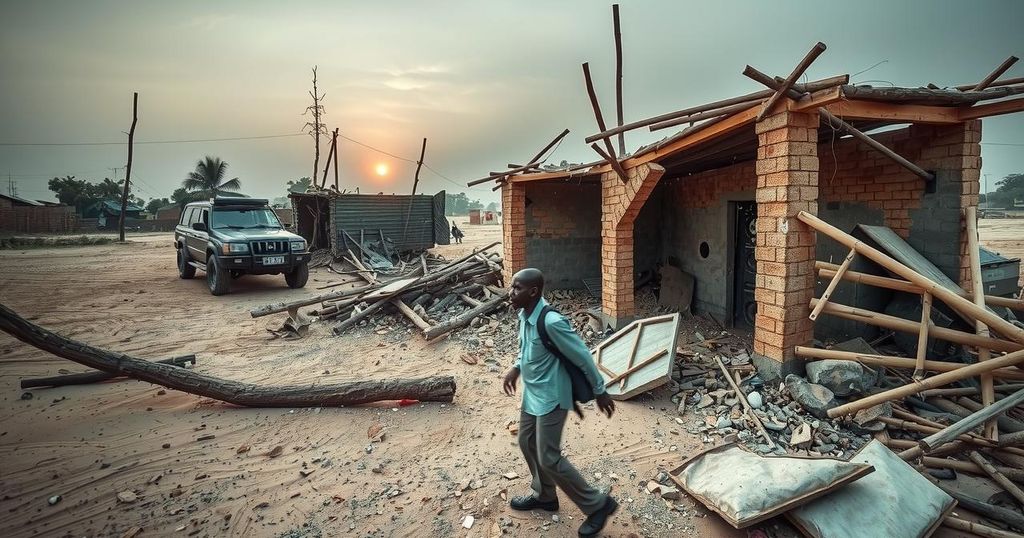Tragic Attacks in Western Niger Claim 39 Lives Amid Rising Jihadist Threat
Niger experienced two deadly attacks near the Burkina Faso border, resulting in thirty-nine fatalities, including children. Recent violence has emphasized the ongoing jihadist threat in the area, compounded by a political response that includes restricting media outlets. The humanitarian crisis continues to escalate, necessitating international support for security and relief efforts.
Recently, violent attacks in western Niger have resulted in the tragic deaths of thirty-nine individuals, including children. These incidents occurred in Libiri and Kokorou, areas that lie close to the Burkina Faso border and are known for frequent jihadist activities. The Nigerien defense ministry reported that twenty-one fatalities were recorded in Libiri and eighteen in Kokorou over a span of operations conducted from December 12 to 14.
The ministry described these assaults as heinous acts targeting innocent civilians, executed by criminal factions under pressure from ongoing security operations. The Tera region, which encompasses the borders of Niger, Mali, and Burkina Faso, has been a persistent battleground for jihadist factions affiliated with groups such as the Islamic State and Al-Qaeda. Their insurgency has led to a cycle of violence that plagues the area and heightens instability.
The recent spate of violence was not an isolated event. On December 7, armed assailants attacked a goods convoy, resulting in twenty-one civilian deaths. Just days later, a substantial incident occurred on December 11 in Chatoumane, where over ninety soldiers and forty civilians reportedly lost their lives, although the Nigerien military junta has characterized these claims as “baseless assertions,” accusing international media of misinformation. As a result, the government imposed a three-month suspension on BBC radio, amidst a broader crackdown on Western media following its coup in July 2023.
Despite military efforts to curb the escalating violence, the situation remains dire. The porous borders and challenging geography facilitate militant activities, thereby perpetuating the cycle of violence against both security forces and civilians alike. The Niger government has called for strengthened security strategies and increased international assistance to mitigate the escalating threats along its borders. Furthermore, the humanitarian crisis exacerbates as violence displaces numerous civilians, leaving them in precarious situations in a region that is already fraught with instability.
The attacks in western Niger highlight the increasing jihadist violence that has afflicted the border regions of Niger, Mali, and Burkina Faso. This geographical area has been historically significant for jihadist groups that exploit its porous borders and challenging terrains to conduct their insurgent activities. The rise of terrorism in this region can be attributed to the ongoing conflict and instability that these nations face, ultimately leading to dire humanitarian consequences for the civilian population. The Nigerien government’s struggles to contain these insurgencies, paired with its recent measures against media reporting, creates an atmosphere of tension and mistrust, further complicating the situation. In addition, the conflict has caused widespread displacement, with many civilians forced to flee their homes, deepening the human crisis. The responses from various government entities also reflect the growing concern regarding the international perception of the region’s issues, as the junta seeks to manage media narratives that deviate from its official stance.
The recent attacks in western Niger, which claimed the lives of thirty-nine individuals, underscore the ongoing jihadist threat that plagues this border region. The government’s struggle to effectively combat these groups is complicated by political instability and international scrutiny. With the humanitarian landscape worsening due to mass displacements and violence, there is an urgent need for enhanced security measures and international cooperation to address these escalating threats and protect vulnerable populations. The situation calls for immediate attention to prevent further loss of life and promote stability in this critical region.
Original Source: dailypost.ng




Post Comment